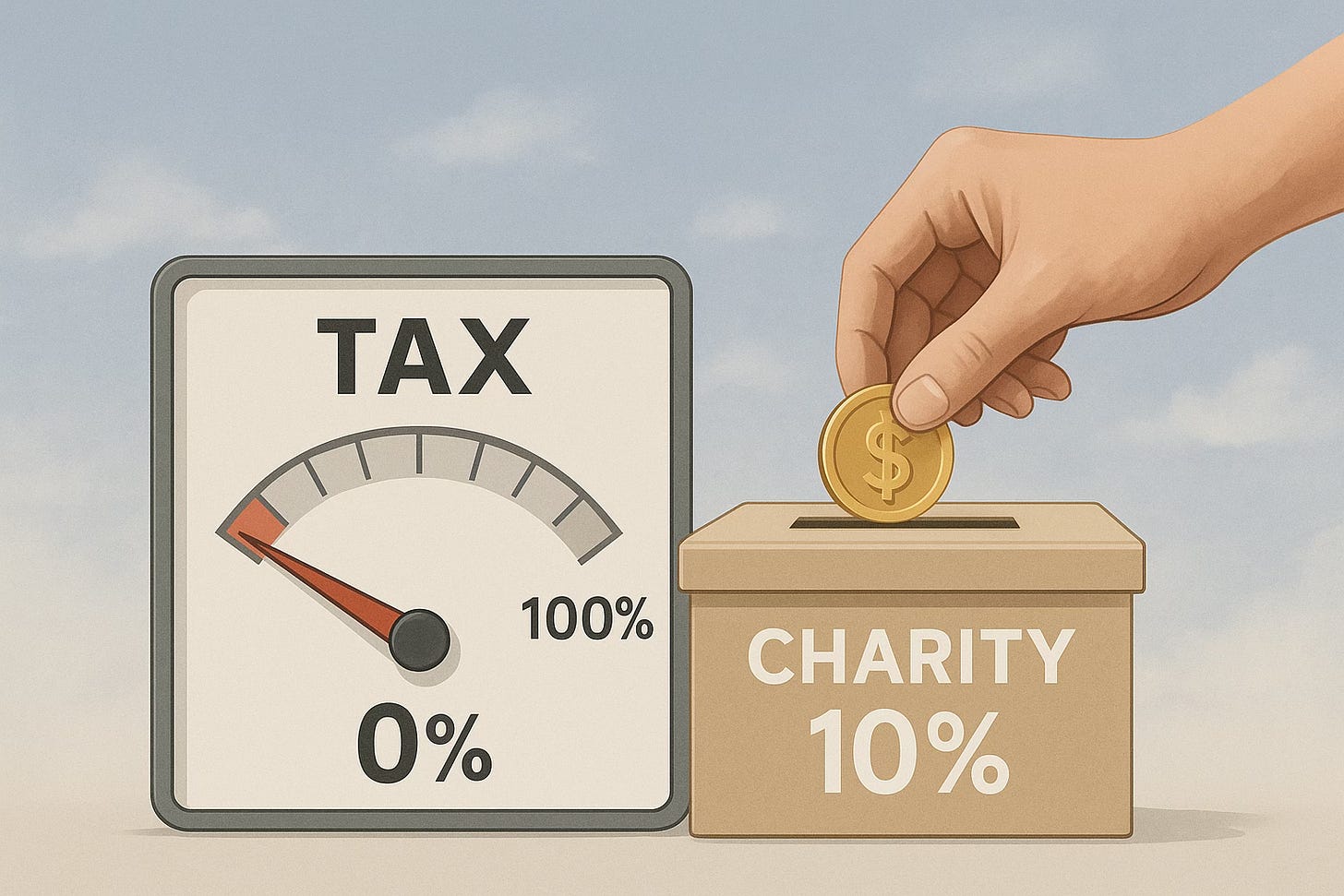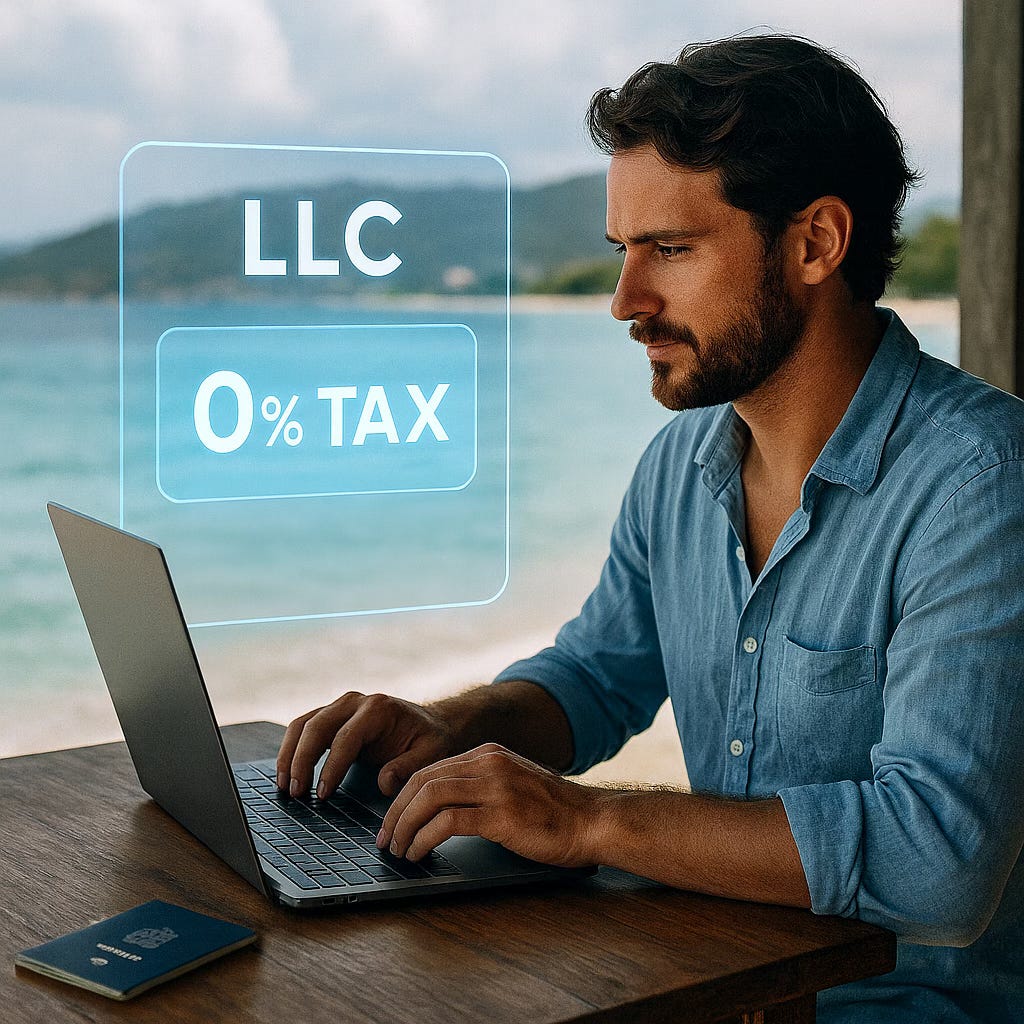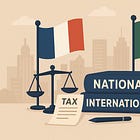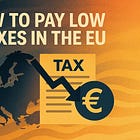The 0% Tax, Zero-Accounting Business
Thanks to the American Loophole
Note : This article is the 7th in a series on how to significantly reduce your tax bill and maximize your freedom by moving abroad. Here are the first articles in the series :
Many digital nomads who are not Americans typically set up 1) a residence in a country with territorial taxation, which therefore doesn't tax income generated abroad, and 2) an American LLC.
What's the point? An LLC in the "right" U.S. state has a number of advantages:
0% U.S. taxation, provided 1) you have no physical presence in the U.S. (no office, no warehouse, no employees, no U.S. companies or freelancers working exclusively for your business), and 2) you have few customers in the U.S. (ideally, none at all )1.
Anonymity: no one can see that you are the owner of the business, unlike many countries that require you to make this information public, provided you set it up in one of the four states that allow this anonymity: Delaware, Nevada, New Mexico or Wyoming. Please note, however, that the IRS and other branches of government will know your identity, as will the bank you use, the payment processor and so on. Quite simply, no one will be able to find this information by searching the Internet.
No information is transmitted abroad, as the USA has not signed the CRS discussed in previous articles - it is the last developed country not to have done so. In theory, this makes it possible to defraud the tax authorities as you did in the 90s or earlier, but again, I wouldn't recommend doing this: firstly, the US administration could transmit this data following a request from foreign tax authorities; secondly, the tax authorities in your country have other ways of detecting that you're defrauding them. Instead, go abroad and take full advantage of the freedom the Network gives you. For those of us who cherish our privacy, the absence of any information being shared abroad is just a bonus.
No accounting required: in New Mexico, for example, you only have to fill out two documents a year and send them to the IRS.
The state generally used is New Mexico, which requires the least reporting and paperwork.
Note that, if you live in a country that has implemented CFC rules - which is the case in the vast majority of countries - managing this LLC creates a permanent establishment in the country in which you live, which will be taxed like a normal corporation.
This is why LLCs are mainly used by digital nomads who either have no legal tax residence, or are domiciled in a country with a territorial tax system.
Keep in mind that, in theory, running an LLC in a territorial tax jurisdiction like Panama or Costa Rica creates a permanent establishment in that country, and its income is taxed there, since it is not generated abroad but through a local establishment.
However, these territorial tax countries are notoriously uninterested in this situation, knowing full well that they would not collect any additional taxes by applying this rule, but would simply drive the residents concerned elsewhere.
If you live in such a country and want to comply with this regulation to the letter, you can simply use a local company when you're in that country, and your LLC when you travel outside the country.
If you travel for six months a year, this will halve your tax rate. If it's 3 months of travel per year, that's a 25% tax savings.
Comparable entities
LLCs are the best-known structures for this purpose, but there are others, notably UK LLPs, or Estonian OÜs (very easy to set up by becoming an Estonian e-resident, which takes just a few minutes online). With the right organization, you can end up with 0% tax with these companies.
A note on 0% tax

I have a lot of digital nomad friends, and I've noticed one thing: the vast majority of them appreciate being taxed at 0%, but very few put finding that rate at the top of their priorities.
For example, I haven't noticed even a modest inclination to leave Dubai after the introduction of the 9% corporate tax among my local friends and acquaintances.
Most of them feel that the 9% is more than worth the quality of services rendered in return, and that it makes no difference: Dubai remains one of the best value-for-money locations for governance services in the world.
Because at the end of the day, many people understand that governance services such as infrastructure, security, or sound governance come at a price, and they're just looking for 1) good value for money to 2) live in a place they appreciate.
This second point is very important. Again, at the end of your life, you'll remember your love letters more than your bank statements, so don't bury yourself in a place you don't like just to pay less tax. It's a big world out there, full of exotic places that have much more to offer than low taxes.
If, however, you are taxed at 0%, you can take this as an invitation to choose your own taxes, as I did when I decided to donate 10% of my earnings to charity, as I mentioned in the introduction.
Likewise, understand that even products and services subject to intense competition never see their price drop to zero: so there's no reason why governance services should be free.
Note also that people who are officially at 0%, such as those like me who lived in Dubai before 2024, are never actually at 0%: they often pay VAT or an equivalent tax on the products and services they buy, and other direct and indirect taxes, on alcohol, airline tickets, etc., as well.
So, even if France dropped all taxes except VAT tomorrow, you'd still be paying around 20% tax on everything you spend2 !
That's right: even those who live in tax havens can't completely escape taxation. Which seems only fair, to finance the governance services we use.
Coming Soon :
This article concludes our mini-series. In the next series, we will look at new forms of governance that are fueled by the Internet, rather than disrupted by it.
Stay tuned! In the meantime, feel free to follow Disruptive Horizons on X/Twitter & Linkedin, and join the tribe of Intelligent Rebels by subscribing to the newsletter :
And here are the first articles of this series :
There are many nuances to this rule.
Approximately, as some products have a reduced VAT








